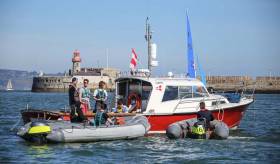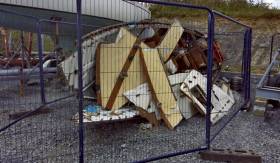Displaying items by tag: Pegasus
Although the Royal St. George Yacht Club officially welcomes its new Committee boat ‘Pegasus’ to Dun Laoghaire Harbour today, the new vessel has already started its 2017 work, pictured above, on station yesterday at the Leinster School's Team Racing Championships.
The new acquisition will be the 'hub' for many of the sailing activities at the Dun Laoghaire club.
Loose Gas Hose Likely Culprit In ‘Pegasus’ Explosion
#MCIB - A loose gas hose is the most likely cause of an explosion that sank a restored classic yacht in Galway Bay earlier this year, according to the official investigation into the incident.
As previously reported on Afloat.ie, an attempt to boil a kettle almost ended in tragedy with the blast on board the 26ft sloop Pegasus on Saturday 9 April, just months after her first full season following relaunch.
Both sailors on board — the owner and a colleague — survived the incident, with the former treated for burns to his hands, though the boat itself was destroyed.
Investigators from the Marine Casualty Investigation Board (MCIB) determined that the explosion was most likely caused by a build-up of gas in the bilges of the boat over a number of minutes after the cockpit valve was turned on, which ignited when the owner struck a match to light the newly installed stove.
While the MCIB report was not able to determine the exact layout of the gas cylinder, regulator and hose connected to the cooker prior to the incident, it was found that the hose itself was too large for its connections despite being clamped, and had likely loosened some time before, allowing gas to leak.
The investigation also noted that the vessel had no gas alarm, which would have given ample warning of a leak to those on board.
The full MCIB report is available to download below.




























































